|
|
|
Sort Order |
|
|
|
Items / Page
|
|
|
|
|
|
|
| Srl | Item |
| 1 |
ID:
091710
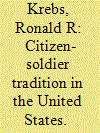

|
|
|
| 2 |
ID:
163245


|
|
|
|
|
| Summary/Abstract |
cholars have vigorously debated whether adversaries carefully scrutinize if states have, in the past, demonstrated toughness and whether adversaries base present and future crisis-bargaining behavior on this record. If they do—as a central strain of deterrence theory, and its contemporary defenders, maintain—hard-line policies, including limited military interventions, can bolster deterrence. We know much less about a second audience that is presumably attentive to demonstrations of resolve: allies. A common view, derived from the same logic, and which we call Hawkish Reassurance Theory, suggests that states should support and find reassuring their allies’ faraway military interventions. In contrast, we argue that such interventions call into doubt the intervener’s will and capacity to fulfill its core alliance commitments, undermine the credibility of the alliance, and threaten allies’ security in both the short and long run. Allies thus ultimately oppose powerful partners’ hawkish postures in distant conflicts, and they may even consequently explore routes to security beyond the alliance. To assess this argument, we examine the varied stances leading US allies took from the start of the US intervention in Vietnam through its end. Allied behavior was largely consistent with our expectations. We conclude that, if one reason to deploy force is to signal to allies that you will come to their aid when they call, states should not bother.
|
|
|
|
|
|
|
|
|
|
|
|
|
|
|
|
| 3 |
ID:
157700


|
|
|
|
|
| Summary/Abstract |
RONALD R. KREBS reviews Richard Haass’ new book, A World in Disarray, which makes the case for U.S. leadership in constructing a new legitimate world order. He argues that Haass’ vision is driven by nostalgia for a world that never existed and that it warrants caution: world-shaping ambitions have proven extremely costly.
|
|
|
|
|
|
|
|
|
|
|
|
|
|
|
|
| 4 |
ID:
079578


|
|
|
|
|
| Publication |
2007.
|
| Summary/Abstract |
As the costs of the invasion and occupation of Iraq mount, scholars have sought to explain how the United States came to launch this war in the first place. Many have focused on the "inflation" of the Iraq threat, and indeed the Bush administration did frame the national dialogue on Iraq. We maintain, however, that the failure of most leading Democrats to challenge the administration's case for war in 2002-2003 cannot be explained fully by the bully pulpit, Democrats' reputation for dovishness, or administration misrepresentations. Rather, we argue that leading Democrats were relatively silent in the run-up to war because they had been "rhetorically coerced", unable to advance a politically sustainable set of arguments with which to oppose the war. The effective fixing of the meaning of the September 11 attacks in terms of the "War on Terror" substantially circumscribed political debate, and we explain why this discourse became dominant. The Bush administration then capitalized on the existing portrait of Saddam Hussein to bind Iraq tightly into the War on Terror and thereby silence leading Democrats and legitimate the war. The story of the road to war in Iraq is not only one of neoconservative hubris and manipulated intelligence. It is also the story of how political actors strove effectively after 9/11 to shape the nation's discourse of foreign affairs and of how the resulting dominant narratives structured foreign policy debate. Behind the seemingly natural War on Terror lurk political processes of meaning-making that narrowed the space for contestation over Iraq.
|
|
|
|
|
|
|
|
|
|
|
|
|
|
|
|
| 5 |
ID:
146142


|
|
|
|
|
| Summary/Abstract |
Contemporaries and historians often blame the errors and tragedies of US policy during the Cold War on a dominant narrative of national security: the “Cold War consensus.” Its usual periodization, according to which it came together in the late 1940s and persisted until the late 1960s when it unraveled amidst the trauma of the Vietnam War, fits well with a common theory of change in ideas and discourse. That theory expects stasis until a substantial unexpected failure (in this domain, military defeat) discredits dominant ideas and unsettles dominant coalitions. However, systematic data reveal the standard history of this important case to be wrong. Based on a large-scale content analysis of newspaper editorials on foreign affairs, this article shows that the Cold War narrative was narrower than conventional accounts suggest, that it did not coalesce until well into the 1950s, and that it began to erode even before the Vietnam War's Americanization in 1965. To make sense of this puzzle, I develop an alternative theory of the rise and fall of the narratives that underpin and structure debate over national security. Rooted in the dynamics of public narrative and the domestic politics of the battlefield, the theory argues that military failure impedes change in the narrative in whose terms government officials had legitimated the mission, whereas victory creates the opportunity for departures from the dominant narrative. Process-tracing reveals causal dynamics consistent with the theory: failure in the Korean War, which might have undermined Cold War globalism, instead facilitated the Cold War narrative's rise to dominance (or consensus); and the triumph of the Cuban Missile Crisis made possible that dominant narrative's breakdown before the upheaval of Vietnam. This hard and important case suggests the need to rethink the relationship between success, failure, and change in dominant narratives of national security—and perhaps in other policy domains as well.
|
|
|
|
|
|
|
|
|
|
|
|
|
|
|
|
| 6 |
ID:
100916


|
|
|
|
|
| Publication |
Cambridge, Cambridge University Press, 2010.
|
| Description |
xii, 314p.
|
| Standard Number |
9780521157704
|
|
|
|
|
|
|
|
|
|
|
|
Copies: C:1/I:0,R:0,Q:0
Circulation
| Accession# | Call# | Current Location | Status | Policy | Location |
| 055558 | 321.8/KIE 055558 | Main | On Shelf | General | |
|
|
|
|
| 7 |
ID:
118159
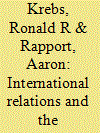

|
|
|
|
|
| Publication |
2012.
|
| Summary/Abstract |
Theories of international relations have often incorporated assumptions about time horizons-a metaphor for how heavily actors value the future relative to the present. However, they have not built on a growing body of experimental research that studies how human beings actually make intertemporal tradeoffs. In this article, we present relevant findings from psychology and behavioral economics, notably those of "construal level theory" (CLT), and explore these findings' implications for three classic questions-international cooperation, preventive war, and coercion. We argue that experimental evidence regarding how people discount future value and construe future events challenges the conventional wisdom on international cooperation. We further maintain that CLT helps explain a longstanding puzzle about preventive wars-namely why they are often initiated too late by declining powers but too soon by rising competitors. Finally, we rely on these findings to explain who wins coercive contests and why compellence is often, but not always, harder than deterrence. Scholars of international relations often embed in their theories crucial assumptions about time horizons, and this article seeks to show what differences it makes if we ground these assumptions in what we know about actual human decision making.
|
|
|
|
|
|
|
|
|
|
|
|
|
|
|
|
| 8 |
ID:
107593
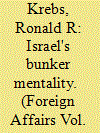

|
|
|
|
|
| Publication |
2011.
|
| Summary/Abstract |
The greatest danger to Israel comes not from without -- in the form of Palestinian intransigence -- but from within. The ongoing occupation of the territories is destroying Israel's values and viability. It breeds an aggressive, intolerant ethnic nationalism and causes political gridlock, empowering an ultrareligious underclass that refuses to contribute and lives off the state.
|
|
|
|
|
|
|
|
|
|
|
|
|
|
|
|
| 9 |
ID:
091373
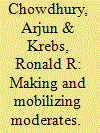

|
|
|
|
|
| Publication |
2009.
|
| Summary/Abstract |
Studies of counterterrorism have argued for the importance of bolstering, or "mobilizing," moderates in the confrontation with violent extremists. Yet the literature has not elucidated when states seek to mobilize moderates and marginalize extremists, how they do so, or when they prove successful. The received wisdom is that states should cultivate and strengthen moderate allies by reaching out to them. This approach, however, fails to grasp the political challenges confronting potential moderates, whose priority is to build and retain legitimacy within their political community. Inspired by network approaches, we maintain that moderates can more easily emerge when their political interactions with the authorities are relatively sparse. We further argue that the state's strategies, including crucially its rhetorical moves, can bolster the moderates' local legitimacy. At times, this will entail not reaching out to moderates but isolating them. Before moderates can be mobilized, they must be made, and the state's criticism, more than its love, may do much to help moderate political forces emerge. This article explains why mobilizing moderates is critical, when it is difficult, and how authorities can nevertheless play a productive role in moderates' emergence. We establish our theoretical framework's plausibility by examining two cases-India's ultimately triumphant campaign against Sikh extremists and Spain's gradual marginalization of Basque extremists. We then suggest what lessons these campaigns against ethnonational terrorism hold for the so-called War on Terror.
|
|
|
|
|
|
|
|
|
|
|
|
|
|
|
|
| 10 |
ID:
069888
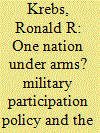

|
|
|
|
|
| Publication |
2005.
|
| Summary/Abstract |
Students of comparative military organizations have advanced three hypotheses to explain when armed forces adopt more liberal manpower policies: when a major security threat looms, when the military professionalizes, or when the surrounding society grows more tolerant of difference. This article argues that all three are theoretically and empirically problematic: they potentially have much to contribute, but only in conjunction with a perspective that is more appreciative of the centrality of political processes. Enduring reform of the military's participation policies is more productively viewed through the lens of the struggle over national and communal identity. To illustrate the power of this alternative approach, this article reconsiders cases commonly cited in support of the existing hypotheses: the racial desegregation of the U.S. military, the integration of the Druze into the Israel Defense Forces, and the imperial and independent Indian armies' policies with respect to what the British termed "class."
|
|
|
|
|
|
|
|
|
|
|
|
|
|
|
|
| 11 |
ID:
151984


|
|
|
|
|
| Summary/Abstract |
DONALD TRUMP is so singular a figure in background and temperament, so large a personality, and so seemingly immune to the usual pressures and incentives, that it is tempting to imagine that foreign policy under him will be simply the projection of his will. Think again. Like presidents before him, Trump will learn that going solo is not a recipe for an effective and enduring foreign policy. Always fraught and frustrating, the domestic politics of foreign policy have in recent years become even harder for presidents to manage. Trump will be no exception.
|
|
|
|
|
|
|
|
|
|
|
|
|
|
|
|
| 12 |
ID:
080770


|
|
|
|
|
| Publication |
2008.
|
| Summary/Abstract |
There is little disagreement in Washington that the United States is losing the so-called Battle of Ideas, and there is a surprising consensus on what needs to be done: "reach out" to Muslim moderates. Bolstering moderate voices in the Muslim world is indeed crucial to the fate of the War on Terror, but "reaching out" to them is no solution. In fact, it is the last thing Muslim moderates need, since it deepens their legitimacy problems. The West's criticism may do more to help Muslim moderates become a political force to be reckoned with than its love ever could. This "cruel to be kind" rhetorical strategy can, and should, be combined with open material support for Arab and Muslim civil society, but crucially without regard to political orientation. Such a policy has its drawbacks and it will be a difficult sell, but it is the only way to make progress in the Battle of Ideas
|
|
|
|
|
|
|
|
|
|
|
|
|
|
|
|
| 13 |
ID:
052053


|
|
|
| 14 |
ID:
095324


|
|
|
|
|
| Publication |
2010.
|
| Summary/Abstract |
Counterterrorist state forces and terrorist insurgents compete to control not only territory and populations but language.The success of counterterrorism, therefore, hinges crucially on representational practices. Defeating terrorism in the long run requires both undermining the legitimacy of political violence and its purveyors and opening space for the pursuit of a less violent but still legitimate politics, and these are fundamentally rhetorical projects. Yet the literature has not shed much light on either the range of conceivable counterterrorist representational strategies or on states' particular representational choices.This article presents and illustrates a typology of counterterrorist representational strategies. It argues that state leaders should ideally delegitimize the extremists' means while politicizing some of their aspirations. Leaders often do not pursue this rhetorical path, however, due to the constraints imposed by existing understandings of terrorist organizations and especially by foundational discourses. These arguments are explored empirically through studies of the Indian, Spanish, and Turkish counterterrorist campaigns. The article concludes by extending the framework to clarify why the militarized rhetoric of the so-called 'War on Terror' is counterproductive.
|
|
|
|
|
|
|
|
|
|
|
|
|
|
|
|
| 15 |
ID:
076862
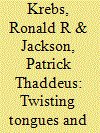

|
|
|
|
|
| Publication |
2007.
|
| Summary/Abstract |
While scholars of International Relations and comparative politics have usually treated rhetoric as epiphenomenal, one strand of constructivism has recently returned rhetoric to the heart of political analysis, especially through the mechanism of persuasion. We too maintain that rhetoric is central to political processes and outcomes, but we argue that persuasion is theoretically and methodologically problematic. We aver that rhetoric's role may be more usefully conceptualized in the context of coercion, and we advance a stylized model that illustrates how rhetorical coercion operates, explains why it works, and identifies key scope conditions. We subsequently illustrate our model's relevance through a detailed examination of a 'hard' case. This article's agenda is twofold. First, it advises scholars in these fields to avoid focusing on unanswerable questions about actors' motives and to examine instead what actors say, in what contexts, and to what audiences. Second, it lays the groundwork for a 'coercive constructivism', complementing the liberal version so prevalent today
|
|
|
|
|
|
|
|
|
|
|
|
|
|
|
|
| 16 |
ID:
143223
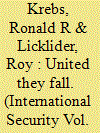

|
|
|
|
|
| Summary/Abstract |
Preventing the recurrence of civil war has become a critical problem for both scholarship and policy. Conventional wisdom urges the creation of capable, legitimate, and inclusive postwar states to reduce the risk of relapse into civil war, and international peacebuilders have often encouraged the formation of a new national army that would include members of the war's opposing sides. However, both the theoretical logics and the empirical record identifying military integration as a significant contributor to durable post–civil war peace are weak. An analysis of eleven cases finds little evidence that military integration played a substantial causal role in preventing the return to civil war. Military integration does not usually send a costly signal of the parties’ commitment to peace, provide communal security, employ many possible spoilers, or act as a powerful symbol of a unified nation. It is therefore both unwise and unethical for the international community to press military integration on reluctant local forces.
|
|
|
|
|
|
|
|
|
|
|
|
|
|
|
|
| 17 |
ID:
060772


|
|
|
|
|
| Publication |
2005.
|
| Description |
p89-104
|
| Summary/Abstract |
Public diplomacy’ has become the holy grail of American foreign policy. In a Washington polarised by sharp partisan divisions, few issues have generated as much consensus. Numerous recent reports from think tanks, blue-ribbon commissions and government advisory groups offer recommendations for how the United States could improve its efforts to sway public opinion abroad, but public diplomacy is the object of a neverending, ultimately futile quest. While the tone and style of US foreign policy could stand improvement, the rest of the world is far more troubled by its substance. Rather than fixating on public diplomacy, pundits and policy makers alike should recognise that America's power and policies are the problem, not its inability to communicate.
|
|
|
|
|
|
|
|
|
|
|
|
|
|
|
|
|
|
|
|
|